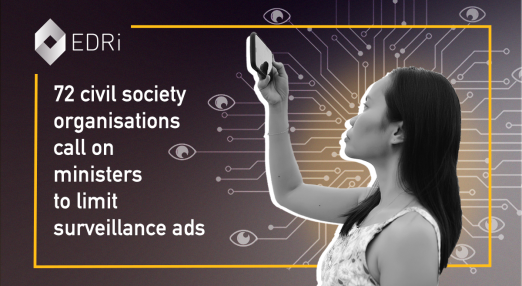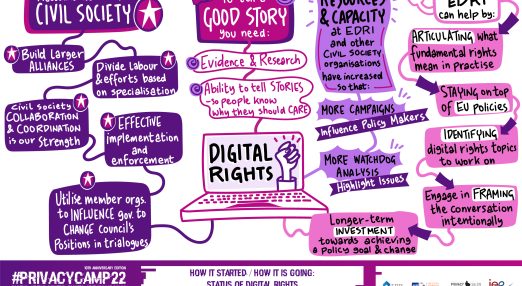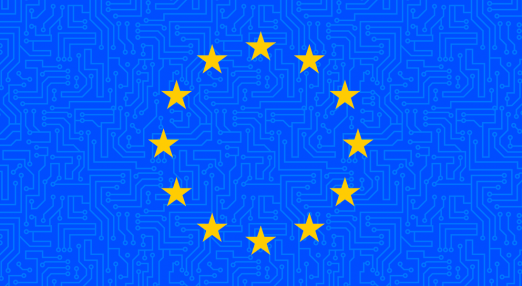Digital Services Act
Filter by...
-

France must not betray European citizens on the DSA at the 11th hour
As civil society, we welcomed Minister Cedric O’s commitment on Friday to prohibit targeted advertising to minors as well as the use of sensitive data for ad targeting in the DSA. Now the French Council Presidency must follow through and protect citizens, 35 NGOs write in an open letter.
Read more
-

Open Letter: Abolish manipulative dark patterns and creepy online ads, ask 72 civil society organisations
Ahead of the upcoming Digital Services Act (DSA) trilogue meeting on 15 March, EDRi, Liberties and Amnesty International and 69 other civil society organisations have sent a joint open letter to 20 ministers and state secretaries in 9 EU Member States. On Tuesday 1.03.2022, several organisations in the Netherlands, Denmark, Germany, France, Spain, Italy, Luxembourg, Austria, Croatia delivered the letter to relevant decisionmakers responsible for their country's position in the EU negotiations.
Read more
-

How it started, how it’s going: Halfway through the current European Commission’s legislative term
In January 2022, EDRi held a panel at its annual flagship event Privacy Camp to discuss the EU’s current legislative term and what to expect by the next EU elections in terms of digital rights.
Read more
-

The EU Parliament takes strong stance against surveillance ads
The Platform Power campaign, alongside many civil society organisations, raised its voice for stronger laws against the business model of Big Tech online platforms and succesfully pressured law-makers to put people at the center of the debate.
Read more
-

Framing the future of the internet
The European Parliament has just voted on the Digital Services Act, crucial for internet regulation.
Read more
-

Platform Regulation: Key takeways from Haugen’s hearing
On 8 November 2021, Frances Haugen, the Facebook whistleblower, participated in a hearing of the European Parliament’s Internal Market and Consumer Protection Committee (IMCO). While her testimony brought extremely important insights into Facebook’s opaque operations, it also showed that Haugen’s thinking of what the digital world in Europe should look like is influenced by her expertise in data science rather than public policy, as well as by her professional experience working with Silicon Valley’s centralised mega-platforms.
Read more
-

European Parliament’s plans of a Digital Services Act threaten internet freedoms
The EU's Digital Services Act is a chance to preserve what works and to fix what is broken. EFF and other civil society groups have advocated for new rules that protect fundamental rights online, while formulating a bold vision to address today's most pressing challenges. However, while the initial proposal by the EU Commission got several things right, the EU Parliament is toying with the idea of introducing a new filternet, made in Europe. Some politicians believe that any active platform should potentially be held liable for the communications of its users and they trust that algorithmic filters can do the trick to swiftly remove illegal content
Read more
-

Disinformation and propaganda: It’s all political!
The disinformation and propaganda campaigns in the European Union (EU) are inexplicably tied to the political parties that misuse the tools of mass media communications to spread fear and deceit (Euractiv, 2021). The media exemption currently debated within the scope of the Digital Services Act (DSA) that would prevent digital intermediaries from interfering with content posted by media outlets is an early Christmas present to the disinformation agents, as it would enable them to continue with their propaganda production, fueled by algorithmic distribution.
Read more
-

Position Paper: The EDRi guide to 2,297 amendment proposals for the DSA
Various committees in the European Parliament have tabled such a large number of amendments for the Digital Services Act (DSA) that today, EDRi publishes a guide to support Members of the European Parliament in navigating those that would help create a successful, open, and rights-respecting European digital sphere.
Read more
-

Big Tech platforms are hurting us. 50 organisations urge the EU to #FixAlgorithms
The list of negative consequences of how dominant online platforms shape our experience online is neither short nor trivial. From exploiting users’ vulnerabilities, triggering psychological trauma, depriving people of job opportunities to pushing disturbing content to others, these are just some examples. While members of the European Parliament debate their position on the Digital Services Act (DSA), EDRi’s member Panoptykon Foundation (Poland), together with 49 civil society organisations from all over Europe, including EDRi, Amnesty International, Article 19, European Partnership for Democracy and Electronic Frontier Foundation, urge them to ensure protection from the harms caused by platforms’ algorithms.
Read more
-

Can the EU Digital Services Act contest the power of Big Tech’s algorithms?
A progressive report on the Digital Services Act (DSA) adopted by the Committee on Civil Liberties, Justice and Home Affairs (LIBE) in the European Parliament in July is the first major improvement of the draft law presented by the European Commission in December. MEPs expressed support for default protections from tracking and profiling for the purposes of advertising and recommending or ranking content. Now the ball is in the court of the leading committee on internal market and consumer protection (IMCO), which received 1313 pages of amendments to be voted in November. EDRi's member Panoptykon Foundation explores if the Parliament would succeed in adopting a position that will contest the power of dominant online platforms which shape the digital public sphere in line with their commercial interests, at the expense of individuals and societies.
Read more
-

The Data Governance Act – between undermining the GDPR and building a Data Commons
Compared to the DSA and the DMA, the DGA has received relatively little attention, both from the digital rights community and, seemingly, from industry stakeholders. So far, the discussion in the EP – where the Internal Market ( IMCO), legal affafirs (JURI) and civil liberties (LIBE) committees have issued opinions – has revealed relatively few clear faultlines.
Read more
